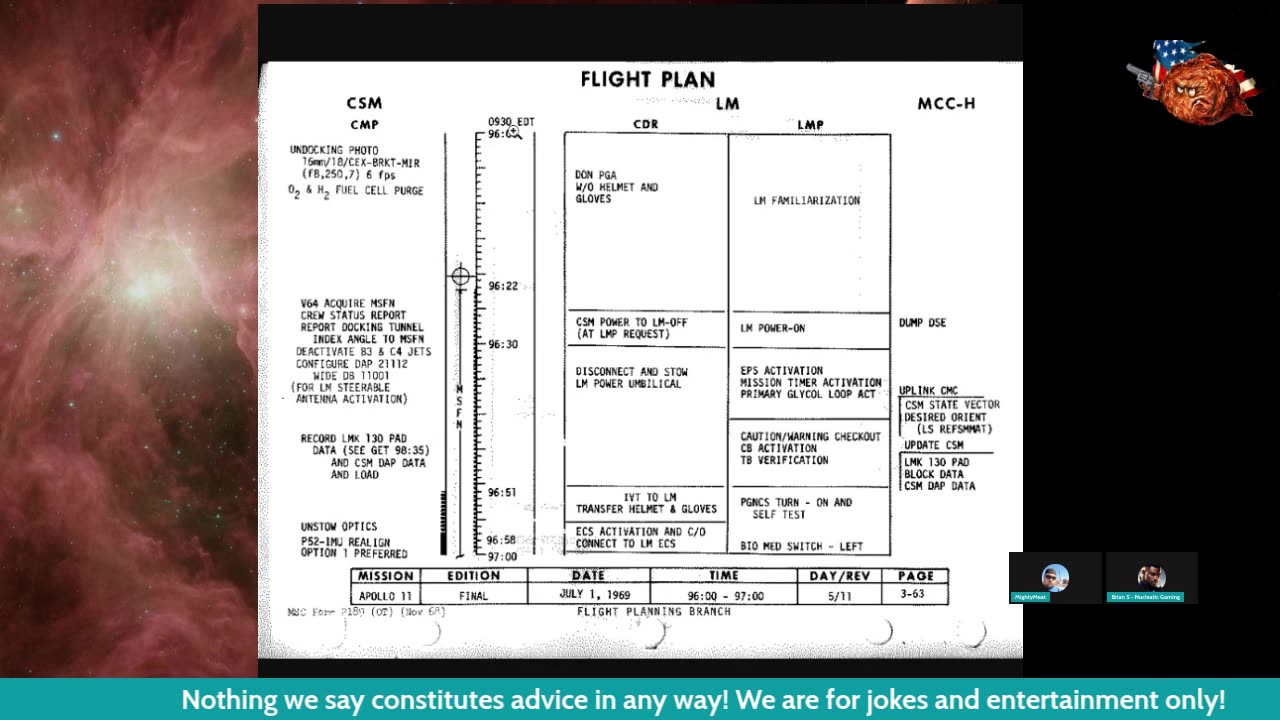Premium Only Content

Apollo Re live Part 2 - The Neil and Buzz Moonwalk
Apollo 11 was the first manned mission to land on the Moon and is one of the most iconic events in the history of space exploration. Here are some key facts about the Apollo 11 mission:
Mission Objectives: Apollo 11 was launched by NASA on July 16, 1969, with the primary objective of landing astronauts on the Moon and returning them safely to Earth. The mission aimed to demonstrate the capabilities required for lunar exploration.
Crew: The Apollo 11 crew consisted of three astronauts:
Neil Armstrong: Mission Commander
Edwin "Buzz" Aldrin: Lunar Module Pilot
Michael Collins: Command Module Pilot
Lunar Module: The Lunar Module, named "Eagle," separated from the Command Module in lunar orbit. Neil Armstrong and Buzz Aldrin descended to the lunar surface in the Lunar Module while Michael Collins remained in lunar orbit.
Lunar Landing: On July 20, 1969, Neil Armstrong and Buzz Aldrin piloted the Lunar Module to a successful landing on the Moon's surface in the region known as the Sea of Tranquility.
First Steps on the Moon: On July 20, 1969, Neil Armstrong became the first human to set foot on the Moon. He famously declared, "That's one small step for man, one giant leap for mankind."
Activities on the Moon: Neil Armstrong and Buzz Aldrin conducted various experiments, collected samples of lunar soil and rocks, and planted the American flag on the Moon's surface. They spent about two and a half hours outside the Lunar Module.
Return to Earth: After spending approximately 21 hours on the lunar surface, the Lunar Module's ascent stage rejoined the Command Module in lunar orbit. The astronauts then began their journey back to Earth.
Splashdown: Apollo 11 successfully splashed down in the Pacific Ocean on July 24, 1969. The crew was recovered by the USS Hornet.
Historic Achievement: Apollo 11 was a historic achievement and a major milestone in the Space Race between the United States and the Soviet Union. It demonstrated American technological prowess and fulfilled President John F. Kennedy's goal of landing a man on the Moon before the end of the decade.
Scientific Contributions: The mission brought back valuable scientific data, including lunar rock and soil samples, which provided insights into the Moon's history and the solar system's formation.
Apollo 11's success marked the beginning of a series of lunar missions and was a significant moment in human history. It remains an iconic event, with Neil Armstrong's first step on the Moon being one of the most memorable moments in the 20th century.
-
 LIVE
LIVE
SilverFox
5 hours ago🔴LIVE - Fox FINALLY plays FORTNITE
95 watching -
 LIVE
LIVE
Fragniac
1 hour ago🌕 Claire Obscur: EXPEDITION 33 - Act II⚔
70 watching -
 28:39
28:39
The Shannon Joy Show
18 hours ago🔥🔥Are Big Tech ‘Wearables’ Really The Key To Good Health? Dr. Chad Walding Says NO! Special Health Update: (Sponsored By Native Path!)🔥🔥
27.3K7 -
 4:53
4:53
Talk Nerdy Sports - The Ultimate Sports Betting Podcast
3 hours agoHome Run Heat & European Sweep: Saturday's Sharps Only Card
9.11K -
 15:06
15:06
Doc Rich
2 days agoThey Leaked Classified Intel...
28.5K27 -
 1:52:48
1:52:48
I_Came_With_Fire_Podcast
13 hours agoSoft POWER: "American First" Does NOT Mean "America Alone"
17.7K1 -
 1:15:25
1:15:25
Wendy Bell Radio
10 hours agoPet Talk With The Pet Doc
42.3K5 -
 2:24:28
2:24:28
Squaring The Circle, A Randall Carlson Podcast
4 hours ago#053 New Discoveries In The Younger Dryas Impact Hypothesis - Squaring the Circle
18.8K3 -
 4:41
4:41
MudandMunitions
14 hours agoGlock 20 Gen 5 10mm Holster Review IWB Vedder Protuck vs JM Custom Kydex for EDC Concealed Carry
16.4K3 -
 7:04:42
7:04:42
FyrBorne
18 hours ago🔴Warzone M&K Sniping: Where TTK and Consistency Meet
38.6K1